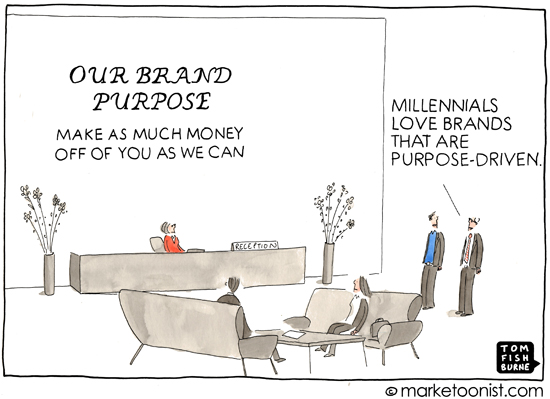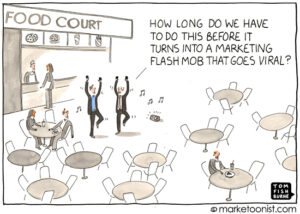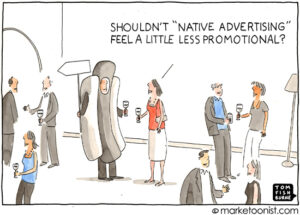Partly to appeal to Millennials, many brands are reframing what they do to sound purpose-driven. Many marketers are feeling pressure to define their “brand purpose” and create campaigns with a higher cause.
The more brands that jump on the purpose bandwagon, however, the more that consumers will be skeptical and cynical about companies’ motivations, even if their motivations are sincere.
Chipotle has been leading with brand purpose for several years with its powerful message to “Cultivate a Better World” (The Scarecrow last month and Back to the Start in 2011). Chipotle is one of the more successful companies in branding with purpose.
Yet even Chipotle has been drawing criticism. The New Yorker wrote, “we’re reminded that Chipotle is a ‘giant corporation,’ tugging at our heartstrings with oppressed bovines not because of a genuine interest in sustainability or animal welfare but to make us buy burritos.”
Many brands are watching Chipotle closely as inspiration for their own purpose-driven campaigns. On the surface, it can seem as simple as making an animated movie about sustainability. Yet marketers need to remember that substance is more important than storytelling. More important than messaging, brands have to practice what they preach.
Brand purpose has to be sincere.
(Marketoonist Monday: I’m giving away a signed print of this week’s cartoon. Just share an insightful comment to this week’s post by 5:00 PST on Monday. Thanks!)



Jerry Holtaway says
In my opinion, one never “markets’ a brand’s purpose; the organization lives in a way that it becomes obvious to all, both within and outside the organization, without a single word necessarily being said. Purpose should become the brand’s way of being, not a promotional gimmick.
Goran says
I agree Jerry.
Sarah Unger says
Millennials have a strong BS filter. An inauthentic “brand purpose” play is probably worse than none at all.
Niamh Cullen says
This is a really key point Tom, brands need to ensure that the messages they are using to communicate with customers tell authentic stories about their brands. You cannot just make this stuff up, it needs to be real. Therefore creating a purpose goes deep into an organisation and involves everyone across the board, not just the marketers creating vehicles to tell the world about it.
At Hoot Marketing we are huge advocates of brand storytelling and chipotle and others do that very well. It can only be a pwerful method of communiation however, if it is authentic. Consumers see straight through anything less. Thanks for your insightful cartoons, they tell great stories (www.hootmarketing.co.uk)
Tracy Lloyd says
Awesome cartoon and very timely, per usual. I agree with your comments Jerry. Live it, don’t market it. How your brand behaves and “lives” your purpose is the way people outside your company will ever truly believe your purpose. Check out Brand Behavior Drives Business Results: http://www.emotivebrand.com/thought/brand-behavior-drives-results/
C.H. says
Another insightful post! Duncan and Moriarty’s Strategic Consistency Model (from their book: Driving Brand Value: Using Integrated Marketing to Manage Profitable Stakeholder Relationships) stresses the importance of consistency between a brand’s say (planned), do (product and service), and confirm (unplanned) messages. The “say” messages are the promises made by the company; the “do” messages express how well a good or service delivers on the promise and meets expectations created by the say messages. “Confirm” messages come from other customers and stakeholders such as the media who either reinforce or contradict the say/do messages (definitions: http://spot.colorado.edu/~moriarts/triangle.html). Gaps between any of these messages threaten brand integrity and brand-stakeholder relationships. This model applies to purpose-driven marketing.
Funny or Die hijacked Chipotle’s “Scarecrow” film and developed their own “Honest Scarecrow” version, questioning Chipotle’s “say” message: http://www.funnyordie.com/videos/da66b8f1aa/honest-scarecrow
In this increasingly transparent and connected world, all paid, owned, earned, and even hijacked media come into play.
David West says
I did watch that chipotle commercial a couple of months back. My first thought was, “prove it”. I know that I didn’t go to the chipotle web site or some third party site. I think that would add a lot of credibility to your comment of do you practice what you preach. This has lead me to think about awards that seem so self driven like for cars… What car doesn’t have a motor or car and driver award of some kind? Are user reviews more valuable than industry ? Yelp, trip advisor, google reviews ,Cnet, consumer reports, etc. … Taken with a grain of salt , but I find them much more telling. Brands that want to engage their customers on their mission and cite values take an active roll on their feedback with timely and thoughtful responses. I don’t know the answer to this but what do you think the response would be if you walked into a chipotle and ask the order taker or cashier about the commercial and follow questions to their vignettes? Brands that are believable I would think have that as part of their core training that any employee can be asked … right? 🙂
Edvin Arnby-Machata says
I think I agree with Jerry, but I think that this premise makes it ‘impossible’ for publicly traded companies to market their purpose, as their purpose is to maximise shareholder value. In the US, this is even inscribed in law: shareholders can sue senior management if they believe they have been making decisions that does not maximise their value.
In that sense, any ‘purpose’-driven marketing by such organisation can be considered false marketing.
However, for-profit companies that do have other purposes need to ‘market’ this purpose if this is needed to strengthen their operations towards this purpose, whether it be in order to increase revenue or awareness of its cause.
Matt says
Brands that grow, consistently over time, tend to be those that set out to better the human condition with a single minded intent. This tends to be their purpose and why brands that can point to one are generally more powerful and successful.
Erika says
I love this one! The brand purpose has to come from a place of sincerity — at the C-level and throughout the organization. There’s significant upside for recruiting and retaining employees if you have a strong purpose they can rally behind too. But if it’s just a sales-motivated gesture, customers will eventually figure that out.
Ann says
My experience is BtoB, so maybe that colors my response to the “purpose-driven marketing” messages. But as a consumer–I’d be ok with a purpose defined as giving me good value for the money I pay… Then if a company is going to add to its brand activities by producing its products responsibly or treating its employees with respect or donating a percentage of profit to a cause they deem worthwhile I can take that into account when making brand choices. But my first concern is the value proposition.
nametagscott says
Great point Tom. The whole purpose thing is sort on a decline in its product lifecycle. Which sucks. I wonder what the next trend will be?
mark barden says
On point as ever, Tom. And an excellent comments stream. Somewhere between Edvin and Matt lies an important truth. At http://www.eatbigfish.com we’ve done some wonderfully rewarding work with clients around purpose and there is always good intent and often a strong track record of success over time — given authenticity and truth. But public companies are still mostly managed to a single bottom line and when this conflicts with the brand purpose money wins in the short term. Most public companies are run on a quarterly basis. They almost has to legally, as Edvin points out. Even if decisions jeopardize long-term purpose. This is why the B Corp idea is so interesting and possibly the best long term bet to manage these kinds of conflicts. It’s difficult though. Not for the faint of heart. Money is such a seductively simple metric to manage around.
One more point though. We often seem to assume that purpose is a serious idea. It doesn’t have to be. Paddy Power, the Irish bookmakers, for example, is very purpose driven, but it’s a long way from playing the Chipotle card.
Claudio says
We know that brands with a meaningful purpose have better growth rates over time. However, because of that everybody now wants to have a brand purpose for his/her company as well. I believe it is important to think about it carefully and then decide whether it’s worth to invest your resources, your money and your focus into a brand purpose. Don’t just do it because you’ve heard that it’ll lead to growth – because then chances are high that you’ll fail. More about it on http://brandlopment.com/create-better-brand-purpose/.
@ Tom: Great cartoon on an important subject. By the way, we used your cartoon in our blog as well.
The Inspired Product Manager says
This cartoon really has a point, and as it shows, most often the brand purpose is to make money (except non-profit brands).
I hope you don’t mind if I link this cartoon on my blog http://inspiredproductmanager.wordpress.com
Michael says
The dilemma: Marketing righteousness without traces of self-righteousness!